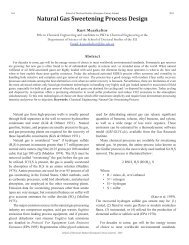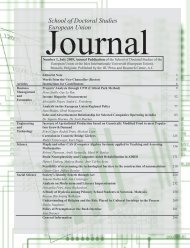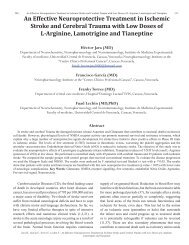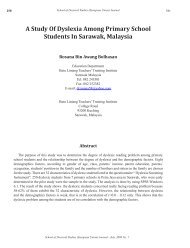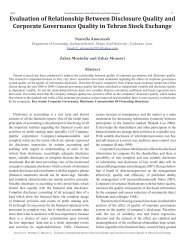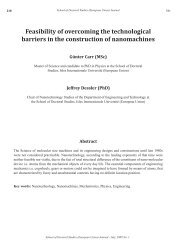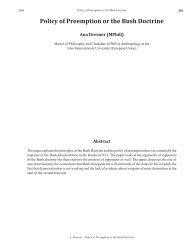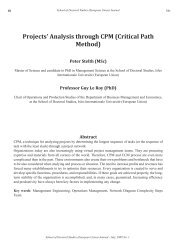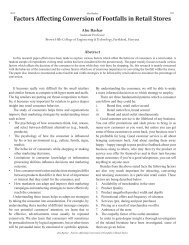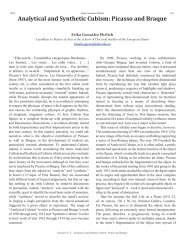Iiuedu.eu
Iiuedu.eu
Iiuedu.eu
Create successful ePaper yourself
Turn your PDF publications into a flip-book with our unique Google optimized e-Paper software.
Empirical Evaluation of the Evidence of the Beneficial Influence of the Strategic Planning Process on the Overall Performance of Emerging2011 Countries Companies11they allow a degree of complementarity of the results.The research parameters are fundamentally different fromone investigator to another. In addition, some studiesare marked by the absence of proof of reproducibility ofmeasurements. Moreover, many investigations have reliedon questionnaires (Ansoff et al. 1970, for example) mailedto companies. In this regard, Grinyer and Norburn rightlyobserve that because the planning process is complex,and spontaneous reactions to questions are important forproper assessment, mailed questionnaires were particularlyinappropriate for an adequate response on the subject.Lesson 1The first conclusion emerging from this analysis ofstudies based on a measure of performance as an indicatorof the relevance of the strategic planning process is thatevidence of a relationship and the nature of the relationshipbetween strategic planning and emerging countriescompanies performance is still unproven. We can’tcomment objectively on the effectiveness or ineffectivenessof the strategic planning process as a management tool.The methodological variability characterizing the differentstudies limits their analysis and comparison. However,by combining different studies according to their results,one finds that those that detected a positive relationship,and cause-effect relationship between strategic planningand corporate performance, are generally older than thosewho found no link and those who perceived harm in usingplanning. This time separation is sufficient to suggestthat the relationship between corporate performance andstrategic planning would evolve over time? Despite thestrategic planning history seeming to go the same way(the popularity decline, then an interest resurgence), thelack of methodological rigor once again doesn’t confirmthis hypothesis. It is rather evidence of the bias in mostof the authors’ studies, and the use of arbitrary attributesor variables. It also shows the inadequacy of the variablesused for an objective evaluation process, and the presenceof other factors than those measured. There are, indeed,a whole range of other variables that may affect thesecompanies’ performance or achievements, so that thechanges detected in the performance of these companiesmay not have been affected, or only partially affectedor affected only by strategic planning. Higher levels inachieving results are not necessarily related to the useof strategic planning. It is also possible that improvedperformance gives these companies the means, resourcesfor use, or the ability to implement strategic planning inits midst. In addition, emerging countries companies canadopt strategic planning in order to protect performancepreviously achieved without planning. In which casethere would be a relationship between strategic planningand performance, but not a causal one. Despite theconclusions he reached with his staff, Igor Ansoff admitsthat a subjective evaluation of results by the managementdoesn’t differ greatly between planners and non-planners,while an objective financial measure shows a substantialdifference. [3] It is therefore difficult to define specificallythe consequences of the use of strategic planning. From thispoint of view the analysis tends to support the model ofHenry Mintzberg.However there is always a category of potential benefitsresulting from the use of strategic planning. Greenley (1986)[7] recognizes in its article profits increased by the use ofstrategic planning, which are inherent in the consequencesof its use. He refers to them in the concept of 'intrinsicvalues of planning'. So there are economic advantages tothe use of strategic planning in emerging countries. Thereremains a strong a priori that strategic planning has a majoreffect on emerging countries companies’ performance. Butdoes planning affect these companies’ performance or doesperformance provide them to resources for managerialattention in strategic planning? Anyway, all the problems ofmeasuring broad performance of these companies suggestthat these results overstate the true relationship betweenplanning and performance. Models based on measures ofperformance are not very suitable for defining the nature ofsuch a relationship.Models Based on a Measurement of ProcessCharacteristics as an Index of Efficiency of theProcessCriticisms Raised by These ModelsIn contrast to studies on the effectiveness of the strategicplanning process related almost exclusively to the financialperformance as a gauge of the value of the planning system,these models start from the assumption that the benefitsof strategic planning are related to nature of the process,and may or may not be a sufficient condition for improvedperformance. Strategic planning can thus be effectiveas a process, despite the performance achieved. Hencethe importance of developing more models not based onperformance of economic dominance. It is importantto take into account the characteristics of the process,and the dimensions of organizational context (includingAmedzro W. G. - Empirical Evaluation of the Evidence of the Beneficial Influence of the Strategic Planning Process on the Overall Performance of Emerging CountriesCompanies



